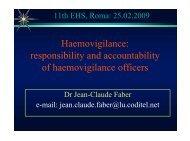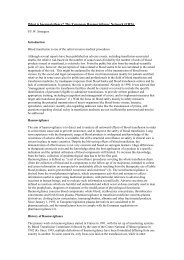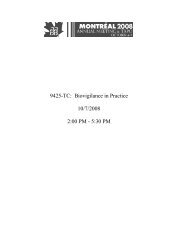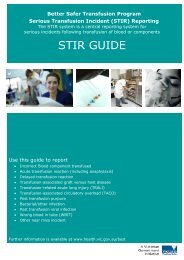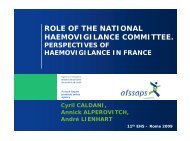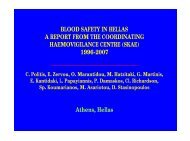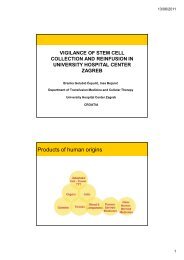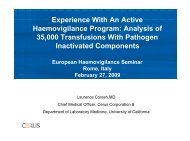SHOT Annual Report 2009 - Serious Hazards of Transfusion
SHOT Annual Report 2009 - Serious Hazards of Transfusion
SHOT Annual Report 2009 - Serious Hazards of Transfusion
Create successful ePaper yourself
Turn your PDF publications into a flip-book with our unique Google optimized e-Paper software.
16. Post-<strong>Transfusion</strong> Purpura (PTP)<br />
Definition<br />
Post-transfusion purpura is defined as thrombocytopenia arising 5–12 days following transfusion <strong>of</strong> red cells<br />
associated with the presence in the patient <strong>of</strong> antibodies directed against the HPA (human platelet antigen)<br />
systems.<br />
Two questionnaires were received but both were withdrawn because neither had alloantibodies directed against HPA.<br />
Cumulative data 1996–<strong>2009</strong><br />
Figure 19 shows reports to <strong>SHOT</strong> since 1996 <strong>of</strong> the annual numbers <strong>of</strong> cases <strong>of</strong> PTP with confirmed HPA alloantibodies: a<br />
total <strong>of</strong> 46 reports. A sustained decrease in the number <strong>of</strong> these cases has been seen since the introduction <strong>of</strong> universal<br />
leucodepletion in late 1999.<br />
Since 1996, platelet antibodies with specificity for HPA-1a have been the most frequently identified. Thirty-six patients<br />
(78%) have had HPA-1a antibodies either alone (31 cases) or in combination with other antibodies (5 cases). In 10<br />
cases PTP was due to other HPA antibodies without HPA-1a. These included antibodies with specificity for HPA-1b, -2b,<br />
-3a, -3b, -5b and 15a, <strong>of</strong> which HPA-1b and HPA-3a antibodies were found most frequently (5 cases each). HPA-5b<br />
antibodies were found in only 1 case. All except one <strong>of</strong> the cases with non-HPA-1a antibodies were reported before the<br />
introduction <strong>of</strong> universal leucodepletion in 1999.<br />
Figure 19<br />
Number <strong>of</strong> cases <strong>of</strong> confirmed PTP reported to <strong>SHOT</strong> each year<br />
12<br />
11<br />
10<br />
Number <strong>of</strong> cases<br />
9<br />
8<br />
7<br />
6<br />
5<br />
4<br />
3<br />
2<br />
1<br />
0<br />
1996–97<br />
1997–98<br />
1998–99<br />
1999–00<br />
2000–01<br />
2001–02<br />
(15 months)<br />
2003<br />
Year <strong>of</strong> report<br />
2004<br />
2005<br />
2006<br />
2007 2008 <strong>2009</strong><br />
Further information about PTP is available in Practical <strong>Transfusion</strong> Medicine. 46<br />
RECOMMENDATIONS<br />
Clinicians are encouraged to contact Blood Services if they suspect PTP.<br />
Recommendations still active from previous years<br />
■■<br />
Clinicians need to maintain awareness <strong>of</strong> this rare but treatable complication <strong>of</strong> transfusion.<br />
16. Post-<strong>Transfusion</strong> Purpura (PTP) 127





